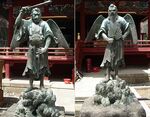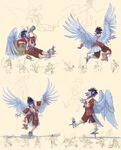Appearance
In traditional art tengu are portrayed as human-like creatures with a bird's beak or a long and beak-like nose, wings and tailfeathers on their backs, and claws on their fingers and toes. Some of the more monstrous depictions give them scaled digits or lips, pointed ears, mouths full of sharp teeth, three-toed bird's feet, or somewhat bat-like webbed flight feathers. Like many demons, they are often associated with the color red.
Being shape-shifters, tengu are capable of assuming a variety of forms or casting various illusions to deceive humans, but their primoridal nature is definitely avian. They hatch from enormous eggs (despite almost always being male), and make their homes in the sugi (Cryptomeria) trees that make up much of Japan's forests. Although today they are often associated with crows, ravens, and the like (karasu can refer to any member of genus Corvus), the first bird they were identified with was apparently the black-eared kite, Milvus lineatus.
Other items tengu sometimes have on their person include a Buddhist monk's ringed staff (shakujō); feathered or straw cloaks that grant their wearers invisibility; tall, awkward-looking one-toothed geta sandals (nicknamed tengu geta); and feathered magic fans or a the leaf of the Aralia japonica plant, both of which are called ha-uchiwa. The hauchiwa is used either as a device to alter the length of the tengu's nose (making him less obviously inhuman), or to produce a ferocious, hurricane-like wind. The latter use is not surprising, as tengu were supposedly descended from the furious storm god Susano-o-No-Mikoto.
Personality
They are said to enjoy spreading chaos and confusion in the human world, punishing the vain, annoying the powerful and rewarding the humble folk who can join in their nocturnal merrymaking without fear. Sometimes they kidnap people and leave them wandering through the woods in a state of dementia called tengu-kakushi, but sometimes they are called upon to help lost children find their way home
Tengu could still be very dangerous to those who threatened their homes or insulted them - as they were extremely arrogant beings by nature. In some traditions, tengu were the reincarnations of haughty priests or samurai who had misused their power, and in their current life they particularly detested pomposity and pretentiousness in humans.
Lore
Tengu appear frequently in the orally-transmitted tales collected by Japanese folklorists. As these stories are often humorous, they tend to portray tengu as ridiculous creatures who are easily tricked or confused by humans. During the 14th century, the tengu began to trouble the world outside of the Buddhist clergy, and like their ominous ancestors the tiāngoǔ, the tengu became creatures associated with war. Legends eventually ascribed to them great knowledge in the art of skilled combat.








